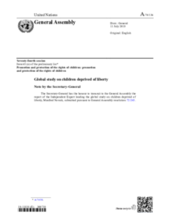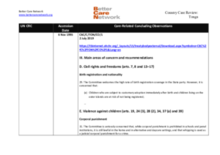Displaying 431 - 440 of 1510
The aim of this article is to offer a working blue print to guide the adaptation of quality initiatives aimed at transforming residential care in other child welfare organizations or jurisdictions while taking into consideration the fit of such initiatives within the service environment and the complexities of system-wide change.
This study was designed to extend previous research, help explain the role of the residential childcare context in bullying behaviors, and explore the relation of bullying with psychological distress among youths in residential childcare in Spain.
The present report summarizes the detailed findings of the global study on children deprived of liberty, the first scientific attempt, on the basis of global data, to comprehend the magnitude of the situation of children deprived of liberty, its possible justifications and root causes, as well as conditions of detention and their harmful impact on the health and development of children.
This open access article details a culturally informed approach by sharing the findings of a Cultural Healing Program (CHP) designed, developed and delivered by an Aboriginal Community Controlled Organisation. The program was for Aboriginal survivors of institutional child sexual abuse who had also experienced cultural abuse having been forcibly removed from their families as children and in the process disconnected from their communities, culture and land.
The aim of this article is to analyse the evaluations made by the main stakeholders involved in the school situation of young people in residential care and propose an explanatory model of their level of school satisfaction (SS) based on variables related to the youngsters' subjective well-being. The sample was composed of 219 subjects from five European countries (Germany, Austria, Croatia, Spain and France), including 75 young people, 75 caregivers, and 69 teachers.
The aim of this article is to analyse the evaluations made by the main stakeholders involved in the school situation of young people in residential care and propose an explanatory model of their level of school satisfaction (SS) based on variables related to the youngsters' subjective well-being.
This country care review includes the care-related Concluding Observations adopted by the Committee on the Rights of the Child.
Without access to their own families, how do young, unaccompanied refugee minors re-establish their social lives in ways that facilitate a sense of togetherness in their everyday lives during resettlement? This question was approached by exploring young persons’ creation of relational practices and the kinds of sociomaterial conditions that seemed to facilitate the evolvement of these practices in Norway, including the professional caregivers’ contributions.
This thesis paper explores (1) how children in care in the UK are making use of mobile communication devices for contact with members of their familial and friendship networks; (2) to what extent devices like the smartphone, tablets and computers either improve or hinder communication; and (3) how contact using mobile communication devices and Internet is being managed by foster carers and social workers.
The purpose of this paper is to propose a conceptual framework on the key determinant of psychosocial adjustments in terms of behavior, social, emotion and mental health among abused children in residential care.



